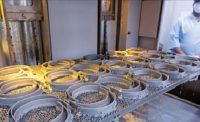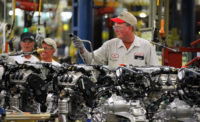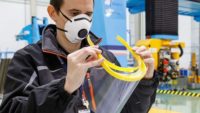GEORGETOWN, KY — At Toyota’s assembly plant here, engineers are constantly on the lookout for ways to build cars safely, quickly, within budget, on time, and with exceptional quality—all at very high volumes.
To help with those efforts, Toyota invested more than $80 million to build the Production Engineering and Manufacturing Center (PEMC) adjacent to the factory. The facility, which opened in October 2017, provides floor spaces for testing technologies and techniques for welding, plastics, painting, assembly and other processes and materials before they hit the assembly line. In addition, an on-site maker space known as the TILT Lab.
The 7,000-square-foot facility is packed with modern technology that helps reinforce creativity and forward thinking. Staffed by a team of 12 technicians, engineers, designers and interns, the lab is loaded with equipment for prototyping, such as laser and waterjet cutters, 3D printers and CNC milling machines.
In March, the lab had a new challenge: Help in the fight against the COVID-19 pandemic. The team quickly adapted the innovative makerspace to address the sudden demand for plastic face shields for healthcare workers treating those who’ve contracted the virus.
“We specialize in problem solving and rapid prototyping,” says Tim Buschur, senior engineering manager. “We work on things like advanced robotics and experimental equipment. We partner closely with R&D and Toyota AI Ventures on new technologies.”
But the TILT Lab is not alone. To help meet the supply shortfall for personal protective equipment, Toyota Motor North America Inc. (TMNA) has committed to the fabrication and donation of 500,000 commercial-grade face shields through June.
“We are grateful for those in the medical community who are on the front lines day and night dealing with this uncertain situation,” says Mike Bafan, chairman of Toyota Motor Manufacturing de Baja California and Toyota Motor Manufacturing de Guanajuato, and group vice president for TMNA’s Manufacturing Project Innovation Center.
The gratitude is not abstract. Shipments began in late March and production of approximately 13,000 face shields per day are underway at Toyota facilities in Alabama, Kentucky, Michigan and Texas. As of the middle of April, over 61,000 face masks had been produced, and 56,600 had been shipped. Allocation of face shields is a phased approach based on the prioritized needs of medical facilities, state health departments and Governor-directed distribution centers where Toyota has major operations. Approximately 73 organizations in 18 states will receive Toyota-made face shields.
At the TILT Lab, this large-scale effort can be observed up close as Buschur and his colleagues saw a way to begin helping immediately and moved quickly to do what they could with the tools available.
Step 1: Fire Up the 3D Printers
Initially, that meant using their 3D printers to produce headbands for the shields, following instructions circulated by Stratasys—one of the leading suppliers of 3D printers. In addition, the TILT Lab pressed its laser cutter equipment into service to turn large sheets of clear plastic into multiple individual shields that could be easily attached to the headbands.
Within a few days, the lab was able to produce and ship 200 shield kits per day.
Step 2: Shift to Injection Molding
With the 3D printer process underway, the team innovated an injection plastic mold that promised to fabricate the headbands at a much faster rate than before. Under normal circumstances, Buschur says the production engineering team can create this type of mold for a production part in eight to 10 weeks. This one was completed in less than five days.
To further boost output, the TILT Lab shared its mold’s design, capable of producing two headbands at a time, with R&D counterparts in Ann Arbor, MI. They, in turn, reconfigured it to generate a “four-cavity mold” that can produce four headbands on each pass. Currently, the plastics production engineering team is working on a third mold that can double the output again to eight headbands at a time. Buschur says the molds were completed and ready for use by April 12.
The impact of this accelerated development has shown encouraging results. Combined, the TILT Lab and R&D facility are now producing 3,200 face mask kits each day. When the new mold comes on stream, the team is looking to achieve a combined output of 10,000 per day.
Step 3: Box and Ship the Kits
In addition to making the parts, the TILT team has created assembly lines to pack 100 kits per box, apply labels and ship them to those most in need. A parallel packing line, developed by R&D, came online the week of April 13.
The pace at which the team has worked brought its own challenges. Buschur says the process of receiving orders from all over the country, printing the specific labels and required paperwork for each hospital, in addition to logging the details of each shipment quickly created a bottleneck. Typically, a web application to automate and visualize the entire system (order, approve, make, pack, ship and track) would take six to eight weeks to develop. The team created theirs in just three days.
In a similar spirit of process improvement, TMNA is also sharing its best practices with companies that produce ventilators and respirators, among others. These efficiencies will help speed up the manufacturing of medical supplies and equipment, as well as support supply chains and operations.
Focus is everything. Efficiency is essential. And lasers come in several forms. “This is pretty much all we’re doing right now full-time,” says Buschur. “The genesis behind the creation of this lab was to speed up innovation and try to change the culture of the company from within. Typically processes like this move much more methodically. It shows what we can do when we all work together.”






